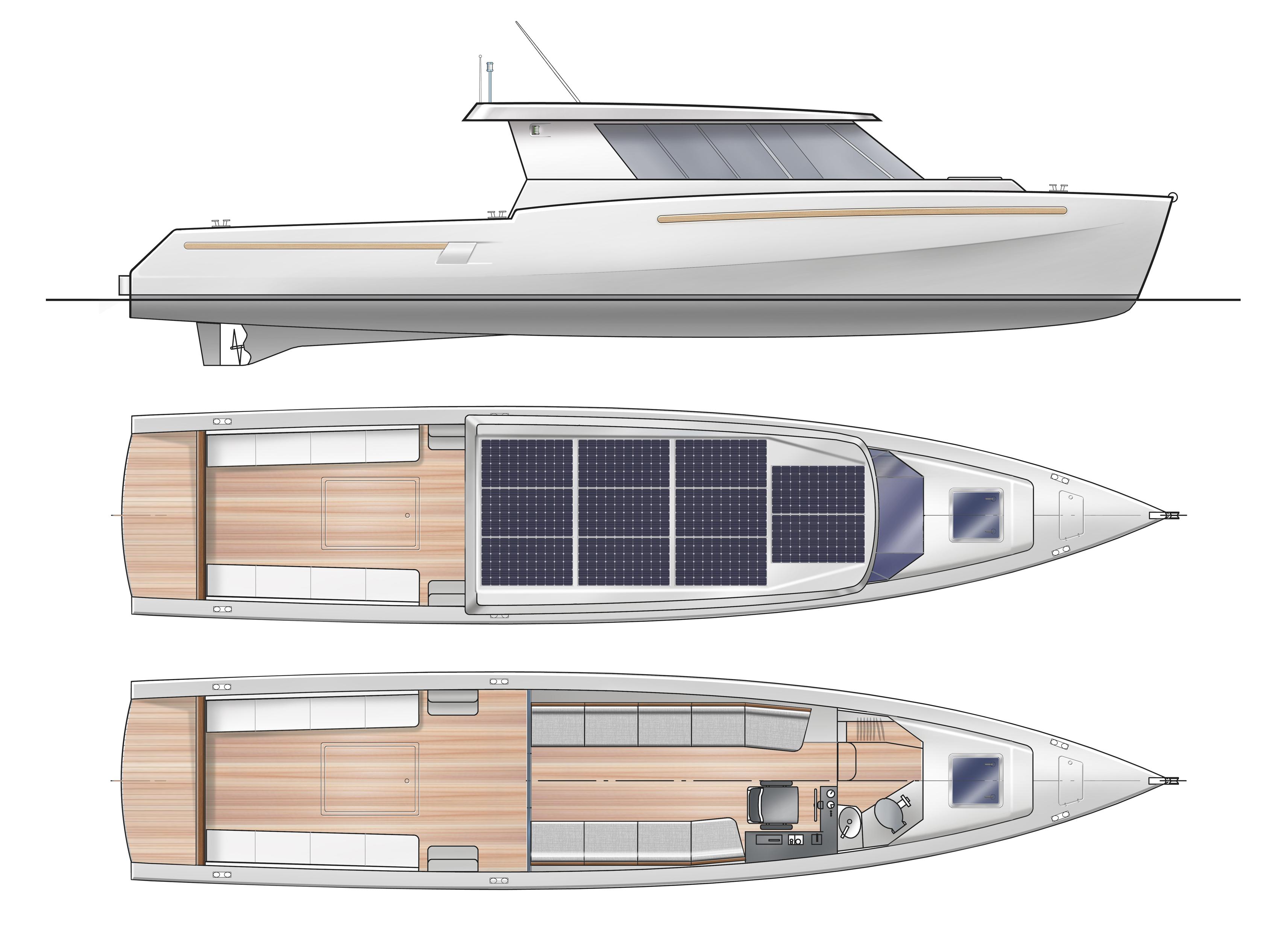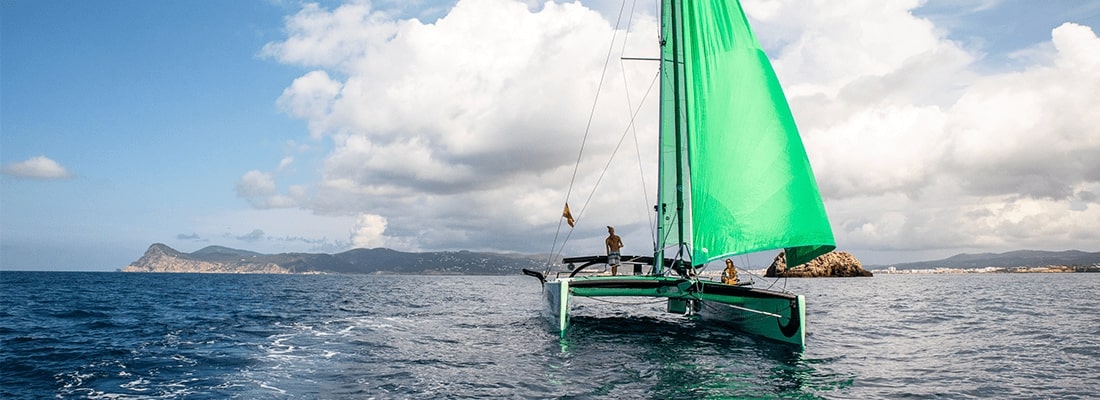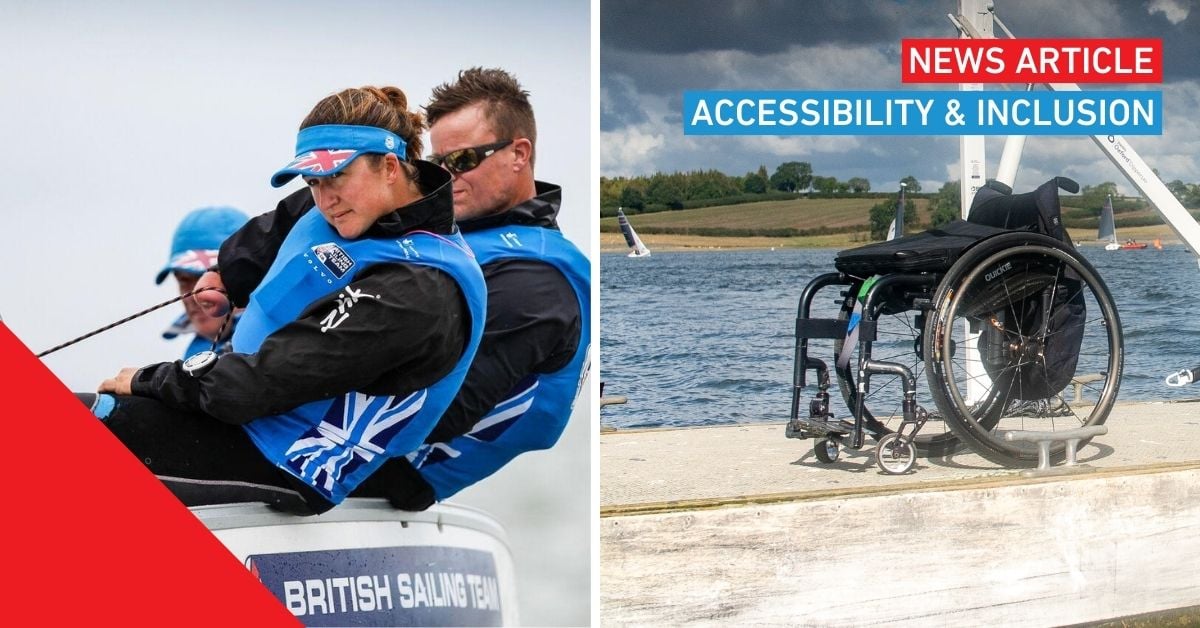Sustainable boating projects highlighted
Several interesting yachting sustainability projects were being showcased at this year’s Palma International Boat Show. A company called La Belle Verde was selected as the winning entry in the 3rd edition of the Boat Show Investment Forum, where nine nautical projects requiring development funding presented their concepts to potential investors.
Emission free sailing
Engaged in building and developing solar-powered boats, and converting conventional vessels into hybrid or electrically powered boats; La Belle Verde, as the name suggests, is a company specialising in green boating. Started by two captains and a marine biologist on the Balearic Island of Ibiza, the trio set out five years ago to develop a solar powered catamaran specifically for the popular tourist day charter market on the island. With an ambition to provide fun, entertainment, and enjoyment of the natural ocean environment they said, “We want everyone to have a good time, without mother nature having to suffer as a result of it!”
The three co-founders of the company had always dreamed of building the perfect solar ‘day trip’ catamaran, and after 5 years of detailed and arduous development, they finally launched La Belle Verde´s Series 1 Eco Cat last autumn. With the final addition of a lightweight solar bridge which harvests maximums power from the sun, and hydro generated power when under sail, the new catamaran operates entirely electrically, and emission free. Apart from operating a charter business locally, La Belle Verde is now offering their proven eco-friendly yacht to other entrepreneurs, who wish to start or expand a charter business without adding to C02 emissions and air pollution levels.
The trio has also started the La Bella Verde foundation, a charitable aim that will be raising funds to assist with environmental protection schemes in their local area of Salinas, which is a UNESCO World Heritage Site. Specifically, they will focus on the reduction of single-use plastics, improvement of recycling, providing education in sustainability and renewables for schools, and organising beach clean ups throughout the year.
Ocean Observer - pushing boundaries
Another project being driven by a partnership of three individuals committed to sustainable boating was also presenting its credentials. I spoke with one of them, Antoni Font, an environmental activist and consultant, with more than thirty years of experience sailing around the Mediterranean. Toni explained that he has sailed over 3,000 miles electrically since 2011, on board WWFSolar, the campaigning boat for the World Wildlife Fund’s sustainability outreach in Spain.

Originally named Sun 21, the catamaran undertook the first motorised crossing of the Atlantic in 2007, covering 7000 nautical miles on solar power only! Now, utilising a lot of experience and knowledge from this pioneering vessel, Toni and his partners have designed an eco-friendly monohull motor yacht called the Ocean Observer 39. Under their direct supervision on the East Coast of Mallorca in Porto Colom, the construction of a sleek looking vessel with a distinctive profile, and an imaginative environmentally friendly build specification is taking shape right now.
Traditional and green
Porto Colom has a long history of building fishing boats (called Llauts) and other seaworthy vessels, so much of this established workmanship is being incorporated into the new boat. The hull is constructed from strip planking made from American cedar wood, and bonded to the frames with epoxy resin. Then, in order to protect the wood and obtain a durable finish, an outer skin made of linen vegetable fibre is impregnated and attached to the hull with organic epoxy resin. The total weight of the material is only 350 g/sqm which is about half the weight of a fibreglass textile of similar durability.
Toni points out that in using this method, as opposed to GRP construction, the boat will be very light at around 3 tonnes, and that the greenhouse gas emissions and non-renewable energy consumption are significantly favourable. The amount of resins used will constitute only around 12% of the weight of the boat, which allows for good waste management at end-of-life, which he estimates can be up to 50 years with adequate maintenance.
Proven electric propulsion
Obviously with many thousands of electrically driven sea miles behind them, the Ocean Observer team have chosen the same well tested propulsion technology for their new creation. Working with the German electric vehicle specialist Asmo, they will be incorporating a similar solar powered engine to the one that drove the Sun 21 across the Atlantic. Thanks to the availability of the new generation of light and compact Li ion batteries, the package will include a Motenergy brushless 20Kw motor, driving the propeller shaft via reduction and direct transmission. The system is mechanically well tested and allows for very simple maintenance.
Toni’s business partner Mark Wüst said, “We are building the boat that we would wish to sail in!” Mark is a Swiss engineer with extensive experience in building and operating electric boats, including being part of the team that designed the Sun 21 for her Atlantic crossing.
Note: Don’t forget to visit the E-nnovation Lab at METSTRADE 2019 this November, to see and discuss the latest developments in Electric and Hybrid propulsion.
Share your stories on leisure marine industry with us
Do you have an innovation, research results or an other interesting topic you would like to share with the leisure marine equipment industry? The METSTRADE website and social media channels are a great platform to showcase your stories! Let us know via metstrade@rai.nl
Are you a METSTRADE exhibitor?
Make sure you add your latest press releases to your Company Profile in the Exhibitor Portal for free exposure.




